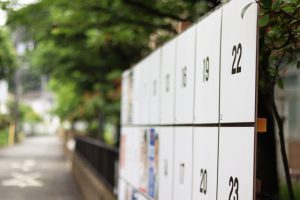Religion and Politics in Japan
 Recently in Japan, the relationship between politics and religion, particularly “new religions” such as the Unification Church (now formally the Family Federation for World Peace and Unification), has been a frequent topic of discussion. This is due to former Prime Minister Shinzo Abe’s killer deciding to carry out the murder due to Abe’s support for the Unification Church, which the killer believed was to blame for his family falling apart.
Recently in Japan, the relationship between politics and religion, particularly “new religions” such as the Unification Church (now formally the Family Federation for World Peace and Unification), has been a frequent topic of discussion. This is due to former Prime Minister Shinzo Abe’s killer deciding to carry out the murder due to Abe’s support for the Unification Church, which the killer believed was to blame for his family falling apart.
With increased public interest in this issue, the Liberal Democratic Party (LDP) held a survey on relationships between LDP Diet Members and the Unification Church and its related organizations, announcing the results on September 8. According to those results, of the 379 LDP Members in the House of Representatives and House of Councillors (not including the presiding officer of either House), 179 had some form of contact with the Unification Church, with 121 Members admitting they had a closer connection of some kind, such as receiving election support. Prime Minister Kishida declared that the LDP would sever all ties with the Unification Church, as well as apologizing for shaking the public’s trust and saying they would take the results of the survey seriously.
Below is a brief introduction and discussion of opinions and articles from intellectuals knowledgeable about religion, looking at the relation between religion and politics in Japan based on two themes: 1) The relation between religion and politics in post-World War II Japan, and 2) The problems with the Unification Church.
(1) The Relation between Religion and Politics in Post-World War II Japan
After World War II, the GHQ was of the opinion that Japan’s militaristic nationalism was closely related to worshipping the emperor as a god and State Shinto, and so implemented various measures to separate politics and religion.
The Constitution of Japan explicitly mentions freedom of religion (Article 20) and the separation of religion and the state (Article 89.) With this, the public’s freedom of religion is ensured, and the state is not to engage in any activities supporting specific religious organizations. However, religious organizations were not forbidden from participating in political activities or elections.
Many of the new religions that expanded after the war grew increasingly involved in politics, either making their own political organizations to have candidates run in elections or supporting candidates from existing parties. Numerous religious organizations are thought to be intentionally approaching conservative politicians by exposing beliefs and opinions similar to those of the right-leaning members of Japan’s ruling party.
It has been suggested that the reason for the collusion between religion and politics is due to a mutually beneficial relationship, providing cooperation in elections and protection for religious organizations.
Tetsuya Miyazaki, a critic, interviewed politicians, and stated, “They all say that even though the numbers are not large, support for votes from religious organizations is extremely reliable, and so ‘is very reassuring.’” With religious organizations functioning as a means to gather votes, Kandai Ogawa, editor of Shukyo Mondai (Religion Issues), suggested they approached politicians for the sake of self-preservation, commenting, “The reason the Unification Church cozied up to the conservatives of the LDP is because they wanted to increase the number of sympathizers they had in the party as a kind of insurance.” (Both quotes from Bungei Shunju, October, “The Unification Church and Soka Gakkai.”)
Regarding links between specific religious organizations and political parties, scholar of religion and University of Tokyo Professor Emeritus Susumu Shimazono commented, “They cannot deny that this relation is said to ignore the public interest and abandon the people,” and noted, “The fact that LDP politicians had connections with a religious organization like that, simply for cooperation in elections, is a stain on the history of Japanese politics.” (The Nikkei online edition, September 15, 2022, “Disinterest brought about by the Unification Church issue—Politics and religion, aim for the common good.”)
Hokkaido University Associate Professor Ryosuke Okamoto gave his analysis that “Many Japanese citizens have some involvement with religion, yet are unaware that they do, and this disconnect between perception and reality is a factor in Japanese society’s vulnerability to religion.” He suggested, “Politicians…should reconsider how they interact with religion as public figures.” (Voice, October, “The ‘invisible religion’ which controls Japanese society.”)
(2) The Problems with the Unification Church
Many of the new religious movements in postwar Japan would reach out to society at large and engage in social and political activities in order to bring about their ideal society.
Considering this, Shimazono mentioned, “Religious organizations being involved in politics is not in itself something to be rejected,” but explained, “However, in modern democratic societies where the separation of religion and the state is considered a basic principle, we must avoid having a specific religion’s ideas of what makes a good person and how to live communally from being brought into politics as is while eliminating all others.”
However, when considering the relation between religious organizations and politics, the Unification Church, which was founded in postwar South Korea by Sun Myung Moon as a Christian new religious movement, has a peculiar character different from other religious organizations. The church has long been considered a social issue in Japan. In particular, it has had multiple lawsuits brought against it for fraudulent spirituality-based sales techniques and for extorting donations, with many civil suits being decided for against the Unification Church.
Discussing the unusualness of the Unification Church’s activities, Joetsu University of Education Associate Professor Hotaka Tsukada noted regarding the reason the church approached politicians, “Their motive was protection for their organization… This was while repeatedly engaging in fraudulent sales and causing social issues.” He gave his analysis that “Although they are clearly engaging in political activities based on their religious ideology, there is also a very strong opportunistic element to those activities considering their mutual interests.” (Chuokoron, October, “The ‘heresy’ of the Unification Church and its political activities.”)
Masaki Goro, a lawyer who supported victims of the Unification Church in their lawsuits, argued that the preaching and proselytizing activities of the Unification Church “…are illegal, violating the public’s freedom of religion (by being proselytized to).” As proof, he mentioned, “Carrying out recruiting while hiding the fact it is for proselytization…teaching the principle of unification, religious doctrine of the Unification Church, as if it is fact or the truth…using concepts that are not in the doctrine to induce faith and elicit large donations.” He argues that the reason the family of Abe’s killer collapsed was due to “the Unification Church carrying out proselytization activities while hiding their true nature.” (Sekai, October, “What is illegal about religious cults?”)
*This page was created independently by Foreign Press Center Japan, and does not reflect the opinion of the Japanese government or any other organization.



